The Federal Energy Regulatory Commission (FERC) is permitting a contractor with a known conflict of interest to monitor Enbridge’s Atlantic Bride natural gas project. This decision joins a growing list of apparent conflicts of interest involved in the project, as DeSmog has extensively reported.
In an internal FERC memorandum sent this week, FERC’s ethics officer authorized the commission’s Office of Energy Projects to continue using a third-party contractor, Environmental Resources Management (ERM), that had produced the project’s environmental assessment. While the work of such contractors is paid for by the pipeline company, they are considered independent reviewers laboring under the supervision of FERC staff who must vet for possible conflicts of interest.
In early 2015, when FERC first hired ERM to review the then-proposed Atlantic Bridge, Spectra Energy was promoting the project. Yet last year, Canada’s Enbridge purchased Spectra. Since ERM currently works for Enbridge on several other projects, the contractor is conflicted and requires special approval by FERC’s legal division to continue working on Atlantic Bridge.
The project, which would transport fracked gas from Pennsylvania through New York and into New England, was approved on the federal level by FERC earlier this year. Having received state permits from New York and Connecticut but pending those from Massachusetts and a federal Coastal Zone Management permit for a compressor station in Weymouth, Massachusetts, Enbridge is eager to begin tree clearing and construction in the approved areas.
“Detrimental Consequences”
In the internal memorandum sent this week, FERC’s designated ethics officer Charles Beamon indicates that Enbridge has requested the continuation of ERM’s services as third-party contractor to provide construction compliance monitoring in the state of New York. Writing to Rich McGuire from FERC’s Office of Energy Projects, Beamon admits that a review of ERM’s recent disclosures to the commission shows it has an ongoing business relationship with Enbridge.
“ERM’s proposed work as the Commission’s third-party contractor for the Atlantic Bridge Project would require ERM to provide services for a project in which its business associate, Enbridge, has an ownership interest through its acquisition of Spectra and Algonquin,” Beamon writes. “ERM’s on-going business relationship with Enbridge includes providing technical and public affairs services in connection with other projects. ERM’s income from its on-going business relationship with Enbridge is less than 1 % of its total revenue for each of the past three years.”
Yet Beamon concurs with McGuire’s reasoning that hiring a new contractor would have “detrimental consequences” for the project, which “would be contrary to the public interest.” Beamon writes, “[N]otwithstanding the above conflict of interest, you have asked that I authorize
ERM to proceed immediately with the specified work.”
Specifically, McGuire cited the construction schedule’s limited tree-clearing window, presumably referring to the upcoming winter weather conditions.
“Pursuing a competitive solicitation process to obtain a different third-party contractor at this juncture would impose further significant delays on the construction of this project,” Beamon writes.
In addition, Beamon notes ERM’s existing knowledge of the project infrastructure and full access to the project environmental survey reports. Finally, he argues that since ERM’s disclosures indicate the work it provides Enbridge is less than one percent of its total revenue for each of the past three calendar years, the contractor does not cross the threshold FERC considers a considerable conflict.
Another Conflict Added to the List
This is not the first problematic relationship surrounding the Atlantic Bridge project.
As DeSmog previously revealed, ERM was already in an apparent conflict of interest since the earliest stages of the project’s environmental review. Through its then-subsidiary Natural Resource Group, the contractor was working for Spectra on its proposed PennEast pipeline, which is related to the Atlantic Bridge project. Despite holding clear evidence Natural Resource Group did not originally reveal its work on PennEast to FERC, the commission ignored this detail when it approved Atlantic Bridge.
Furthermore, the husband of FERC’s environmental project manager for Atlantic Bridge who oversaw the environmental review process, was consulting at the same time on a related gas project led by Spectra, Access Northeast.
Meanwhile, the project’s critics are still mounting an active opposition. On October 3, several organizations sent a protest letter to FERC asking the commission to rescind its approval for Enbridge to begin pre-construction activities in New York. Safe Energy Rights Group, Food & Water Watch, Fore River Residents Against the Compressor Station, Stop the Algonquin Pipeline Expansion, and Resist Spectra argue that the approval is premature since Enbridge has yet to receive the federal Coastal Zone Management permit and two Massachusetts state permits. Additionally, they note, the project still faces several court challenges.
Image Credit: Elvert Barnes Protest Photography, CC BY–SA 2.0
Subscribe to our newsletter
Stay up to date with DeSmog news and alerts







